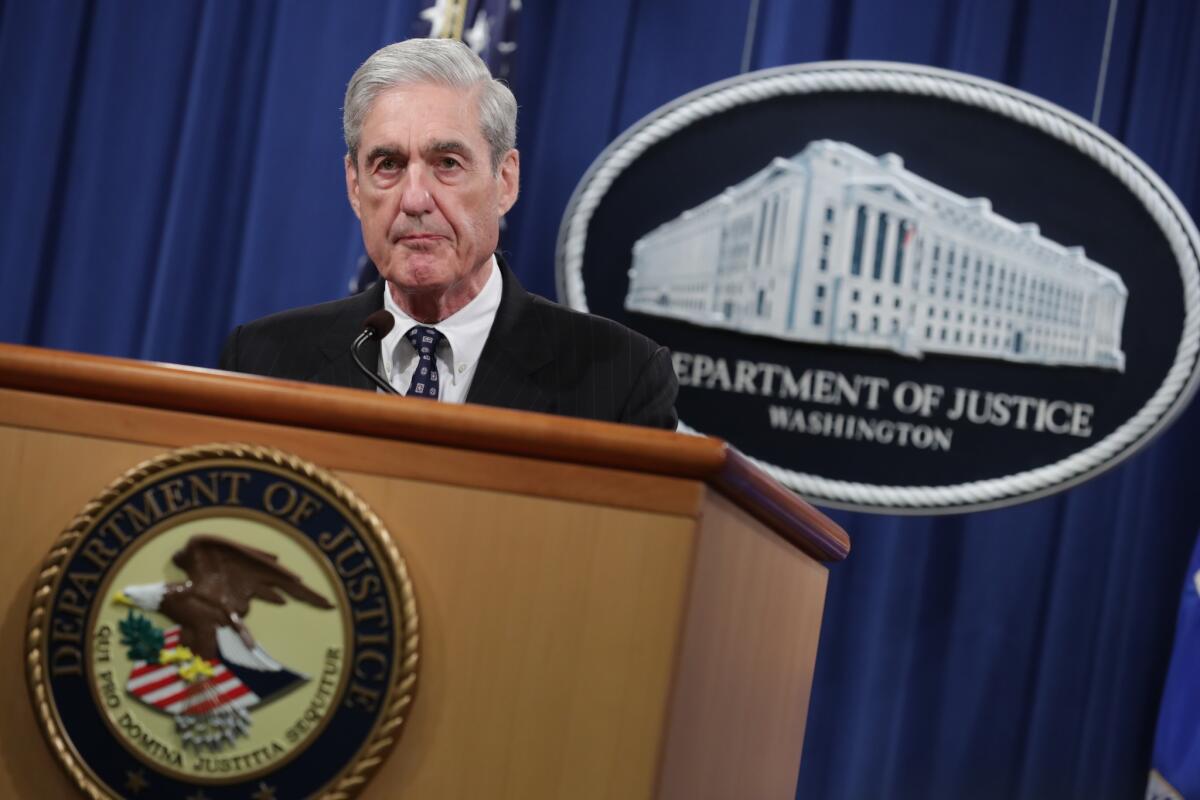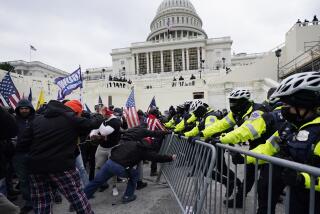Mueller says Trump was never exonerated, warns of future Russian meddling

- Share via
WASHINGTON — Robert S. Mueller III, testifying to Congress on Wednesday for the first time about the Russia investigation, directly contradicted President Trump’s claims that he was fully cleared of any wrongdoing, but the former special counsel also denied Democrats the dramatic TV sound bites they hoped to wield against the White House.
Mueller, 74, gave mostly staccato answers and occasionally appeared shaky or uncertain during nearly seven hours of nationally televised back-to-back hearings in the House Judiciary and Intelligence committees that focused on a 22-month investigation that reached into the White House.
He dropped no new bombshells despite repeated prodding from both Republicans and Democrats — hewing closely instead to the findings of his written report — but his terse responses still will provide ammunition for the partisan battles of the 2020 campaign.
“Did you actually totally exonerate the president?” Rep. Jerrold Nadler (D-N.Y.), chairman of the Judiciary Committee, asked early in the day.
“No,” Mueller responded. Mueller then said “yes” twice when asked if Trump could potentially face charges for obstruction of justice or other crimes after leaving office.
Mueller said his office did not subpoena Trump for an in-person interview after months of negotiations with the president’s lawyers had reached an impasse.
“The expectation was if we did subpoena the president, he would fight the subpoena and we would be in the midst of the investigation for a substantial period of time,” he said.
But he made clear he was not satisfied with Trump’s written answers to questions provided by the special counsel’s office in lieu of an interview.
Asked by Rep. Val Demings (D-Fla.) if Trump’s answers “were not only inadequate and incomplete” but also whether “he was not always being truthful,” Mueller responded, “I would say generally.”
Mueller also took issue with the president’s derisive characterization of his investigation. “It is not a witch hunt,” he said, and the Kremlin-backed efforts to boost Trump in 2016 were “not a hoax.”
The White House was quick to label Mueller’s testimony an “epic embarrassment,” and the president — who previously had said he would not watch — tweeted out critique after critique.
Later, as he left the White House for a fundraiser in Wheeling, W.Va., Trump appeared exultant, telling reporters that Mueller did a “horrible” job and was a “disaster” for Democrats.
“The Democrats had nothing, and now they have less than nothing,” he said.
Mueller refused to answer scores of questions, insisting he would confine himself to the evidence disclosed in the 448-page written report that was released in redacted form in April. But he occasionally went further — or tripped up.
Citing the report, for example, he said Justice Department guidelines barred indictment of a sitting president.
“I’d like to ask you the reason, again, that you did not indict Donald Trump is because of the [Office of Legal Counsel] opinion stating that you cannot indict a sitting president, correct?” Rep. Ted Lieu (D-Torrance) asked in the morning session in the Judiciary Committee.
“That is correct,” Mueller said in what seemed to suggest for the first time that he otherwise would have indicted the president.
But in the afternoon, appearing before the Intelligence Committee, he issued a “correction,” saying he had incorrectly told Lieu that he didn’t charge the president with a crime specifically because of the Office of Legal Counsel opinion.
“That is not the correct way to say it,” Mueller said. “We did not reach a determination as to whether the president committed a crime.”
Mueller mostly was reluctant to render moral judgments on Trump’s conduct. But he made an exception when Rep. Mike Quigley (D-Ill.) asked about Trump’s frequent praise for WikiLeaks during the 2016 campaign.
In the final weeks of the race, Trump hailed the anti-secrecy organization as it published thousands of internal Democratic Party emails that had been hacked by Russian military intelligence officers.
“‘Problematic’ is an understatement in terms of what it displays in terms of giving some, I don’t know, hope or some boost to what is and should be illegal activity,” Mueller said when asked for his reaction.
Rep. Adam B. Schiff (D-Burbank), chairman of the Intelligence Committee, focused on how Trump took advantage of Moscow’s hacking even though Mueller did not establish a criminal conspiracy between the Trump campaign and Moscow.
“The Trump campaign officials built their messaging strategy around those stolen documents?” he asked.
“Generally, that’s true,” Mueller replied.
“And then they lied to cover it up?” Schiff went on.
“Generally, that’s true,” Mueller said again.
Mueller made clear he views the Russian intelligence operation, which also used disinformation on social media to target U.S. voters, as a direct threat to American democracy.
“Over the course of my career, I’ve seen a number of challenges to our democracy,” Mueller said. “The Russian government’s effort to interfere in our election is among the most serious.”
He returned to his concern a number of times. Asked later whether Moscow was continuing its malign efforts, Mueller said, “They’re doing it as we sit here.”
Mueller also ominously warned that foreign election interference could become routine in future elections. “I hope this is not the new normal, but I fear it is,” he said.
Democrats had organized the double-barreled hearings in hopes that Mueller would bring to life the often dense prose from his final report.
But the former Marine sat stiffly, displaying his reluctance to participate in the hearings. Mueller had said he did not want to testify on Capitol Hill, and he agreed only after Democrats issued him a subpoena.
At times, he appeared to struggle to hear the questions, asking lawmakers to repeat themselves or to slow down. He, in turn, was reminded more than once to speak into the microphone so others could hear him.
Some of Mueller’s responses could prove helpful to Democrats who hope to build support for impeachment proceedings against the president. But he generally stopped short of supporting their attempts to paint a larger narrative about Trump’s conduct.
For example, Rep. David Cicilline (D-R.I.) asked Mueller about Trump’s effort to have Corey Lewandowski, his former campaign manager, tell Jeff Sessions, then the attorney general, to limit the investigation to only future cases of foreign interference.
Mueller confirmed various details with monosyllabic answers — “true” or “yes” — but balked when Cicilline tried to string them all together.
“I’m not going to adopt your characterization, but I would say the facts that are laid out in the report are accurate,” he said.
Republicans largely played to Trump’s base by fiercely defending the president and attempting to undermine Mueller’s credibility and that of his investigation.
Rep. Doug Collins (D-Ga.), the Judiciary Committee’s top Republican, pressed Mueller about whether Trump was involved in the “underlying crime” of Russian meddling.
“We found insufficient evidence of the president’s culpability,” Mueller said.
Several Republicans criticized the former special counsel for drafting a lengthy report, which they said exceeded his mandate as a prosecutor tasked with black-and-white decisions about whether to bring charges.
Rep. Guy Reschenthaler (R-Pa.) said it “flies in the face of American justice.”
Rep. Tom McClintock (R-Elk Grove) described the report as an overtly partisan statement intended to undermine the president.
“It’s starting to look like, having desperately tried and failed to make a legal case against the president, you made a political case instead,” he said. “You put it in a paper sack, lit it on fire, dropped it on our porch, rang the doorbell and ran.”
Although Mueller did little to counter most Republican criticisms, he grew animated at McClintock’s characterization and flatly rejected it.
“I don’t think you have reviewed a report that is as thorough, as fair, as consistent as the report that we have in front of us,” he said.
Mueller also rejected Republican accusations that he staffed the special counsel’s office with Democrats who were determined to take down the president.
“I have been in this business for almost 25 years, and in those 25 years I have not had occasion once to ask somebody about their political affiliation,” said Mueller, who headed the FBI for 12 years and served as a senior Justice Department official before that. “It is not done.”
Before the hearing started, Trump was firing off his own complaints about Mueller.
“So Democrats and others can illegally fabricate a crime, try pinning it on a very innocent President, and when he fights back against this illegal and treasonous attack on our Country, they call It Obstruction? Wrong!” he tweeted. “Why didn’t Robert Mueller investigate the investigators?”
The special counsel’s office ultimately charged 34 people, including 25 Russians.
Among those charged were Trump’s former campaign chairman, Paul Manafort; his former national security advisor, Michael Flynn; and his former lawyer and fixer, Michael Cohen. Manafort was convicted at trial, while Flynn and Cohen pleaded guilty.
Trump’s longtime political advisor, Roger Stone, is scheduled to stand trial in November on charges of lying to Congress about his conversations involving WikiLeaks. Stone has pleaded not guilty.
Times staff writers Caroline S. Engelmayer and Del Quentin Wilber contributed to this report.
More to Read
Get the L.A. Times Politics newsletter
Deeply reported insights into legislation, politics and policy from Sacramento, Washington and beyond. In your inbox three times per week.
You may occasionally receive promotional content from the Los Angeles Times.












